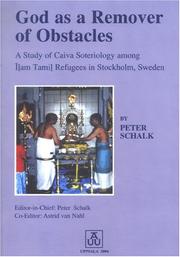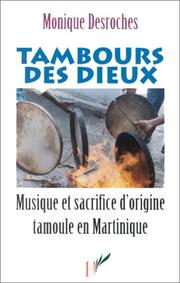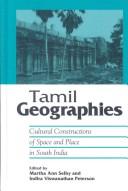| Listing 1 - 10 of 18 | << page >> |
Sort by
|
Book
ISBN: 0190638583 Year: 2017 Publisher: New York, NY : Oxford University Press,
Abstract | Keywords | Export | Availability | Bookmark
 Loading...
Loading...Choose an application
- Reference Manager
- EndNote
- RefWorks (Direct export to RefWorks)
Why are relations between politically mobilized ethnic identities and the nation-state sometimes peaceful and at other times fraught and violent? This work sets out a novel answer to this key puzzle in world politics through a detailed comparative study of the starkly divergent trajectories of the "Tamil question" in India and Sri Lanka from the colonial era to the present day.
Tamil (Indic people) --- Social conditions. --- Tamal (Indic people) --- Tamalsan (Indic people) --- Tambul (Indic people) --- Tamili (Indic people) --- Tamils --- Ethnology
Book
ISBN: 9780824847876 0824847873 9780824852542 0824852540 0824869648 0824838947 Year: 2014 Publisher: University of Hawai'i Press
Abstract | Keywords | Export | Availability | Bookmark
 Loading...
Loading...Choose an application
- Reference Manager
- EndNote
- RefWorks (Direct export to RefWorks)
In 2006 dejected members of the Bukit Jalil Estate community faced eviction from their homes in Kuala Lumpur where they had lived for generations. City officials classified plantation residents as squatters and, unaware of years of toil, attachment to the land, and past official promises, questioned any right they might have to stay, wondering "How can there be a plantation in Kuala Lumpur?"This story epitomizes the dilemma faced by Malaysian Tamils in recent years as they confront the moment when the plantation system where they have lived and worked for generations finally collapses. Foreign workers from Indonesia and Bangladesh have been brought in to replace Tamil workers to cut labor costs. As the new migrant workers do not bring their whole families with them, the community structures-schools, temples, churches, community halls, recreational fields-need no longer be sustained, allowing more land to be converted to mechanized palm oil production or lucrative housing developments. In short, the old, long-term community-based model of rubber plantation production introduced by British and French companies in colonial Malaya has been replaced by a model based upon migrant labor, mechanization, and a gradual contraction of the plantation economy. Tamils find themselves increasingly resentful of the fact that lands that were developed and populated by their ancestors are now claimed by Malays as their own; and that the land use patterns in these new townships, are increasingly hostile to the most symbolic vestiges of the Tamil and Hindu presence, the temples. In addition to issues pertaining to land, legal cases surrounding religious conversion have exacerbated a sense of insecurity among Tamil Hindus. Based on seventeen months of ethnographic fieldwork, this compelling book is about much more than the fast-approaching end to a way of life. Tamils and the Haunting of Justice addresses critical issues in the study of race and ethnicity. It is a study of how notions of justice, as imagined by an aggrieved minority, complicate legal demarcations of ethnic difference in post colonial states. Through its ethnographic breadth, it demonstrates which strategies, as enacted by local communities in conjunction with NGOs and legal advisors/activists, have been most "successful" in navigating the legal and political system of ethnic entitlement and compensation. It shows how, through a variety of strategies, Tamils try to access justice beyond the law-sometimes by using the law, and sometimes by turning to religious symbols and rituals in the murky space between law and justice. The book will thus appeal not only to scholars of Southeast Asia and the Indian diaspora, but also to ethnic studies and development scholars and those interested in postcolonial nationalism.
Tamil (Indic people) --- Plantation workers --- Agricultural laborers --- Ethnology --- Tamal (Indic people) --- Tamalsan (Indic people) --- Tambul (Indic people) --- Tamili (Indic people) --- Tamils --- Land tenure --- Relocation --- Government policy

ISBN: 9155458041 Year: 2004 Volume: 23 Publisher: Uppsala : Acta universitatis upsaliensis,
Abstract | Keywords | Export | Availability | Bookmark
 Loading...
Loading...Choose an application
- Reference Manager
- EndNote
- RefWorks (Direct export to RefWorks)
294.3 <483> --- Boeddhisme--(algemeen)--Zweden --- Śaivites --- Tamil (Indic people) --- Tamal (Indic people) --- Tamalsan (Indic people) --- Tambul (Indic people) --- Tamili (Indic people) --- Tamils --- Saivas --- Shaivas --- Shaivites --- Shivaites --- Sivaites --- Ethnology --- Hindus --- Tamouls
Book
ISBN: 1283142430 9786613142436 1443827940 9781443827942 9781283142434 144382691X 9781443826914 6613142433 Year: 2010 Publisher: Newcastle upon Tyne : Cambridge Scholars Pub.,
Abstract | Keywords | Export | Availability | Bookmark
 Loading...
Loading...Choose an application
- Reference Manager
- EndNote
- RefWorks (Direct export to RefWorks)
The book details the potential of computer mediated technologies, particularly the internet, in creation and nurturing political and cultural identities among the widely dispersed "conflict-generated" Sri Lankan Tamil diaspora and traces the engagement of the disapora in Australia Other the online media in the struggle for a homeland. Taking the ethnic issue in Sri Lanka as a given, the book explores the way in which new media have added dimensions to the issue. Although the theoretical framew...
Tamil (Indic people) --- Internet --- DARPA Internet --- Internet (Computer network) --- Wide area networks (Computer networks) --- World Wide Web --- Tamal (Indic people) --- Tamalsan (Indic people) --- Tambul (Indic people) --- Tamili (Indic people) --- Tamils --- Ethnology --- Political activity --- Political aspects --- Sri Lanka --- Politics and government

ISBN: 2894890095 9782894890097 Year: 1996 Publisher: Montréal Harmattan
Abstract | Keywords | Export | Availability | Bookmark
 Loading...
Loading...Choose an application
- Reference Manager
- EndNote
- RefWorks (Direct export to RefWorks)
Tamil (Indic people) --- Animal sacrifice --- Music --- History and criticism --- Rites and ceremonies --- Ethnomusicology --- West Indies [French ] --- Martinique --- Folk music --- 78.36 --- 78.46 --- Tamal (Indic people) --- Tamalsan (Indic people) --- Tambul (Indic people) --- Tamili (Indic people) --- Tamils --- Music&delete& --- Ethnology --- Sacrifice --- Tamil (Indic people) - Martinique - Music - History and criticism --- Tamil (Indic people) - Martinique - Rites and ceremonies --- Animal sacrifice - Martinique

ISBN: 0791479455 1435653297 9781435653290 9780791479452 9780791472453 0791472450 9780791472460 0791472469 Year: 2008 Publisher: Albany State University of New York Press
Abstract | Keywords | Export | Availability | Bookmark
 Loading...
Loading...Choose an application
- Reference Manager
- EndNote
- RefWorks (Direct export to RefWorks)
Tamil (Indic people) --- Social ecology --- Tamil literature --- Indic literature --- Sri Lankan literature --- Ecology, Social --- Environment, Human --- Human ecology (Social sciences) --- Human environment --- Social sciences --- Tamal (Indic people) --- Tamalsan (Indic people) --- Tambul (Indic people) --- Tamili (Indic people) --- Tamils --- Ethnology --- Criticism and interpretation. --- Tamil Nadu (India) --- Civilization.
Book
ISBN: 0804790507 9780804790505 9780804788069 0804788065 9780804790499 0804790493 Year: 2014 Publisher: Stanford, California
Abstract | Keywords | Export | Availability | Bookmark
 Loading...
Loading...Choose an application
- Reference Manager
- EndNote
- RefWorks (Direct export to RefWorks)
The Right Spouse is an engaging investigation into Tamil (South Indian) preferential close kin marriages, so-called Dravidian Kinship. This book offers a description and an interpretation of preferential marriages with close kin in South India, as they used to be arranged and experienced in the recent past and as they are increasingly discontinued in the present. Clark-Decès presents readers with a focused anthropology of this waning marriage system: its past, present, and dwindling future. The book takes on the main pillars of Tamil social organization, considers the ways
Tamil (Indic people) --- Marriage --- Kinship --- Endogamy and exogamy --- Exogamy --- Ethnology --- Clans --- Consanguinity --- Families --- Kin recognition --- Married life --- Matrimony --- Nuptiality --- Wedlock --- Love --- Sacraments --- Betrothal --- Courtship --- Home --- Honeymoons --- Tamal (Indic people) --- Tamalsan (Indic people) --- Tambul (Indic people) --- Tamili (Indic people) --- Tamils --- Marriage customs and rites, Tamil --- Marriage customs and rites. --- Kinship. --- Tamil Nadu (India) --- Social life and customs.
Book
ISBN: 025301266X 9780253012661 9780253012586 0253012589 9780253012500 0253012503 Year: 2014 Publisher: Bloomington, Indiana
Abstract | Keywords | Export | Availability | Bookmark
 Loading...
Loading...Choose an application
- Reference Manager
- EndNote
- RefWorks (Direct export to RefWorks)
Ayya's Accounts explores the life of an ordinary man-orphan, refugee, shopkeeper, and grandfather-during a century of tremendous hope and upheaval. Born in colonial India into a despised caste of former tree climbers, Ayya lost his mother as a child and came of age in a small town in lowland Burma. Forced to flee at the outbreak of World War II, he made a treacherous 1,700-mile journey by foot, boat, bullock cart, and rail back to southern India. Becoming a successful fruit merchant, Ayya educated and eventually settled many of his descendants in the United States. Luck, nerve, subterfuge,
Merchants --- Nadars --- Tamil (Indic people) --- Shanars --- Caste --- Tamal (Indic people) --- Tamalsan (Indic people) --- Tambul (Indic people) --- Tamili (Indic people) --- Tamils --- Ethnology --- Businesspeople --- Social conditions --- Mariappan, M. P., --- India --- Bharat --- Bhārata --- Government of India --- Ḣindiston Respublikasi --- Inde --- Indië --- Indien --- Indii︠a︡ --- Indland --- Indo --- Republic of India --- Sāthāranarat ʻIndīa --- Yin-tu --- インド --- هند --- Индия
Book
ISBN: 9814695831 9814695750 9789814695831 Year: 2017 Publisher: Singapore : ISEAS-Yusof Ishak Institute,
Abstract | Keywords | Export | Availability | Bookmark
 Loading...
Loading...Choose an application
- Reference Manager
- EndNote
- RefWorks (Direct export to RefWorks)
"This is an important book by Carl Vadivella Belle which argues that Hinduism and its manifestations in the diaspora has important significance in binding not only the Hindus but also encourages 'others' to revisit Hinduism, especially in a multicultural society like Malaysia which is dominated by communally infused discourses structured upon race and religion."
- Ajaya K. Sahoo, Journal of South Asian Diaspora
"Dr Belle weaves his magical journey over nearly half a century, offering poignant and potent insights into the socio economic and spiritual realities of Hindus in Malaysia. Numerous books may be available on Tamil Traditions and Hinduism in Malaysia, but none seem to have succinctly and encapsulated the very essence and heart of these veritable subjects. I would unreservedly recommend this book, to all those interested in matters pertaining to Indians and Hinduism in Malaysia."
- Professor Bala Shanmugam, Federation University
"This is a work of immense inspiration. Combining personal pilgrimage with ethnographic perseverance, it is at once a document of ritual power and cultural change and a biography of religious encounter. By becoming the religious Other, Carl Belle creates a new dimension in the understanding of Thaipusam as both ethnic and individual experience. Dauntlessly frank and insightful, it is without doubt a rare achievement."
- Raymond Lee, Universiti Malaya (retired)
Tamil (Indic people) --- Hinduism --- Thaipusam --- Kavadi (Hindu festival) --- Kavady (Hindu festival) --- Punguni Uththiram Kavady --- Thai Poosam Kavady --- Thai Pusam --- Thaipoosam Kavady --- Fasts and feasts --- Religions --- Brahmanism --- Tamal (Indic people) --- Tamalsan (Indic people) --- Tambul (Indic people) --- Tamili (Indic people) --- Tamils --- Ethnology --- Religion. --- Murugan --- Murukan̲ --- Subrahmaṇya --- Skanda --- Shanmugha --- Kumara --- Karthikeya --- Kartikeya --- Kumāra Svāmi --- Cult --- Murugan (Hindu deity)
Book
ISBN: 9514108981 9514108973 9789514108983 Year: 2001 Volume: 278 Publisher: Helsinki : Suomalainen Tiedeakatemia,
Abstract | Keywords | Export | Availability | Bookmark
 Loading...
Loading...Choose an application
- Reference Manager
- EndNote
- RefWorks (Direct export to RefWorks)
Folk literature [Tamil] --- Littérature populaire tamoule --- Volksliteratuur [Tamil] --- Tales --- Tamil (Indic people) --- Folk literature, Tamil. --- Oral tradition --- Folk literature, Tamil --- -Tales --- -Tamil (Indic people) --- #VCV monografie 2003 --- Tamal (Indic people) --- Tamalsan (Indic people) --- Tambul (Indic people) --- Tamili (Indic people) --- Tamils --- Ethnology --- Folk tales --- Folktales --- Folk literature --- Tradition, Oral --- Oral communication --- Folklore --- Oral history --- Tamil folk literature --- Tamil literature --- Tamil Nadu (India) --- Tales - India - Tamil Nadu. --- Tamil (Indic people) - Folklore. --- Oral tradition - India - Tamil Nadu.
| Listing 1 - 10 of 18 | << page >> |
Sort by
|

 Search
Search Feedback
Feedback About UniCat
About UniCat  Help
Help News
News